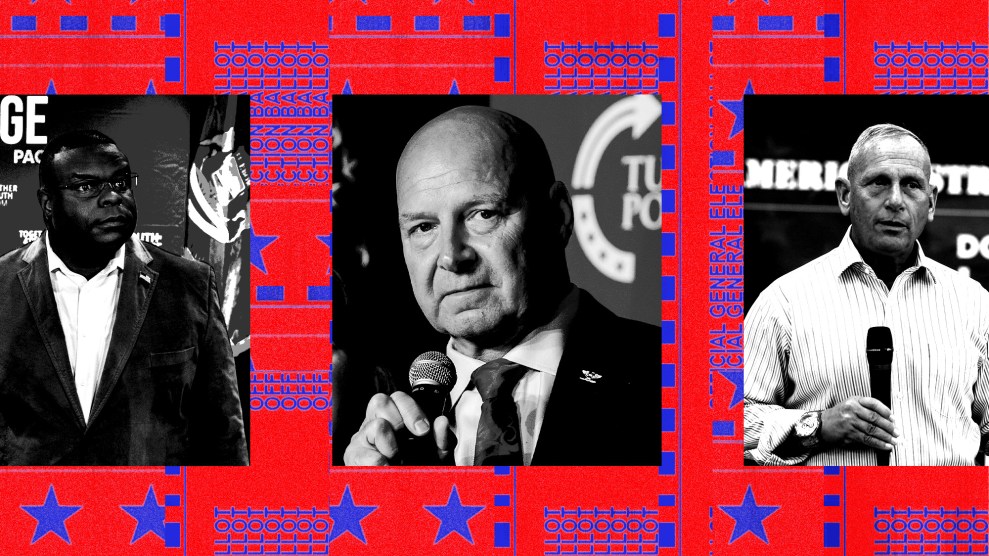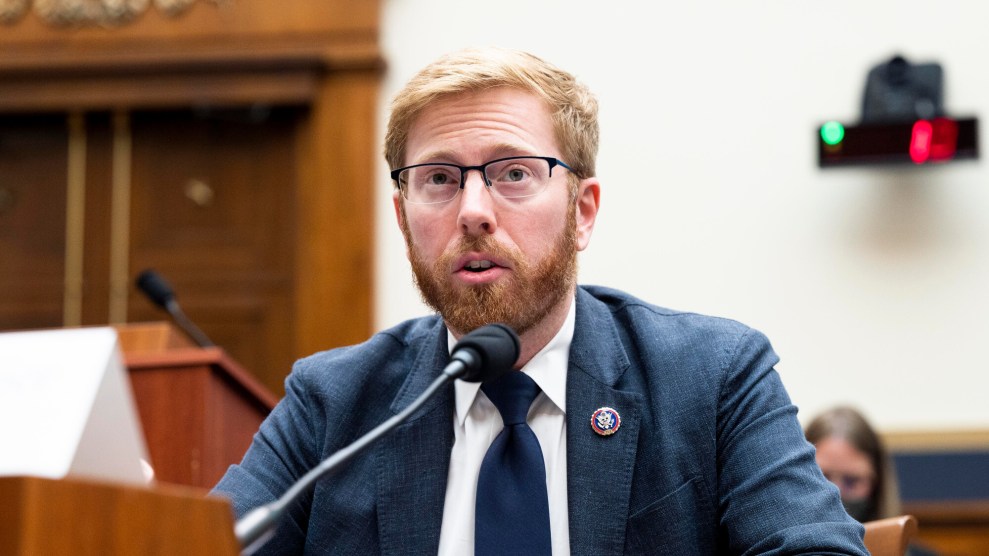
John Gibbs, Doug Mastriano and Don Bolduc.Cory Morse/The Grand Rapids Press/AP; Brian Cahn/Zuma; Reba Saldanha/AP
The Democrats had a plan: Fund the right-wing radicals. For the 2022 midterms, according to numbers compiled by the Washington Post, Democrats spent $19 million in support of far-right Republican primary candidates who denied or questioned the results of the 2020 election. Fringe-right candidates, they assumed, would be less palatable to voters in specific districts and states, during a general election.
It seems like it worked.
Most of the money went towards TV ad buys backing GOP candidates in 13 races across eight states. Six of these candidates won their primaries. And of those six candidates, almost all of them lost their midterm bids in the general election in 2022—with the exception of Kari Lake, whose Arizona governor race is still too close to call.
So, yeah, everything went well, right?
Well, no. Elections aren’t just elections, they’re a part of a permission structure. To win a primary election is in some ways to be deemed acceptable. These people aren’t just losers who are barred from ever running again. They have gained star power.
“Many of these candidates develop a much larger following, even if they lose the current race,” Mike Madrid, cofounder of the Lincoln Project told PBS, referring to fringe candidates who run for office. “What we have seen is, they come back and win for school board or state legislative race or for city councils because of this new awareness and this new recognition.”
With that in mind, here is a quick list of the beneficiaries of Democratic interference money and a sampling of things they believe:
- Doug Mastriano is a Christian Nationalist Republican who ran for governor in Pennsylvania. He once said in a 2018 radio interview that “the Constitution was founded on Christian-Judeo ideas, and it’s only compatible with that worldview.” He has posted Islamaphobic memes. On the coup, my former colleague Noah Kim summed it up well in May, when he won that primary: “Saying that Doug Mastriano was pro-coup in 2020 doesn’t quite cut it. He spoke derisively of the ‘myth of the separation of church and state’ at a QAnon conference. He was at the Capitol on January 6, though there’s no evidence he went inside the building, and he hasn’t been accused of a crime.” This is a big election denier.
- John Gibbs ran in Michigan for a U.S. House seat. In 2016, he tweeted: “JFK’s Dem party: Tax cuts, Anti-commie, strong defense, lunar landing. Today’s Dem party: Islam, gender-bending, anti-police, ‘u racist!’” He has other tweets with hashtags associated with a conspiracy about Democratic operative John Podesta drinking bodily fluids in a satanist ritual. He, of course, also denied the results of the 2020 election.
- Don Bolduc, a candidate for Senate in New Hampshire, who lost to Democratic incumbent Sen. Maggie Hassan, is a proponent of the litterbox in schools hoax that baselessly claims that some schools are accommodating furry students who want to use the bathroom in the same way cats do. He denied the 2020 election results, before accepting them but caveating that there was still election fraud.
- Robert Burns who ran for a House in New Hampshire’s 2nd Congressional District is slightly moderate by election denier standards—he has acknowledged Biden’s 2020 victory but claimed that other unspecified elections were stolen.
- Dan Cox was a gubernatorial candidate in Maryland. He attended a conference earlier this year that promoted QAnon and 9/11 conspiracy theories.
- Darren Bailey, Illinois gubernatorial candidate, didn’t just reference a bizarre far-right conspiracy at a debate, but made sure it was one that was both antisemitic and homophobic.
- Kari Lake, who is in the running for Governor in Arizona didn’t receive any Dem bucks, but the Democratic party essentially attacked her opponent by sending emails to voters that thanked her opponent for donating to Democrats in previous cycles. She too denied the election results and aired a campaign ad featuring a homophobic pastor.
Regardless of the results of this election, Democrats have contributed to bringing a flock of extremists closer to polite society and given them a platform to build for future elections. In so doing, they are bringing their dark, conspiratorial, and hateful perspectives from the far-right closer to the mainstream.
Pat Buchanan lost for years. Now, the Republican party more closely resembles him. David Duke stayed relevant by doing the same. In addition to being a Grand Wizard of the KKK, Duke ran for various offices nine times between 1988 and 2016, winning just one race. Regardless, each run kept his name in the news and gave him an apparatus and excuse to keep soliciting donations to sustain his political project. The name recognition Duke was able to garner in each race helped him to fundraise and try again in the next one, bringing his white nationalist beliefs into the public discourse with him.
Democrats might have won on Tuesday but they might not be so lucky next time.
If they keep funding the far-right it will risk creating an accelerationist hate incubator. That’s not worth it.

















